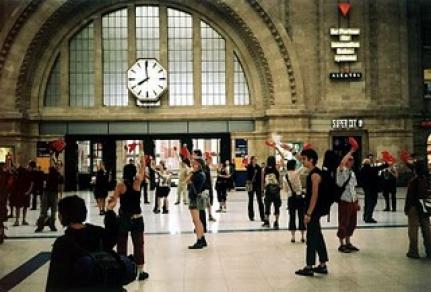
Patric Primavesi
Prenašanje gest. Situacija in intervencija v radijskih performansih skupine LIGNA
Dispozitiv, ki se je nekoč imenoval 'javna sfera', se je neverjetno spremenil: mesta, ki so prej štela za javna, so privatizirana, nadzorujejo jih kamere in varnostniki glede na bolj ali manj vidna pravila obnašanja.
Produkcije LIGNA (berlinske skupine performerjev in radijskih umetnikov), ki reflektirajo ta razvoj, organizirajo intervencije, situacije širjenja. Udeležence povabijo, da izvajajo gibe in geste po navodilih, ki jih prenašajo po prenosnih radijskih oddajnikih: scenarije za revolucionarno (ali vsaj nepravilno) obnašanje v nakupovalnih središčih, na železniških postajah, trgih itd. Predavanje bo obravnavalo te scenarije, njihovo zmožnost, da izvajajo dispozitiv družbe nadzora in tudi da ga zmotijo.
Patrick Primavesi je profesor teorije gledališča na Univerzi v Leipzigu. Njegova biografija vključuje dramaturško delo, delo asistenta z nemškimi gledališči (med njimi: Einar Schleef, William Forsythe, The Opera, The Tat ...). Skupaj s Hansem-Thies Lehmannom je sooblikoval podiplomski študij dramaturgije. V raziskovalnih projektih se posveča povezavam in odnosom med rituali, festivali, javno sfero, gledališčem kot oblikami kulturnih praks. Objavlja eseje na temo sodobnega gledališča in performansa, še posebej Bertolta Brechta, Heinerja Müllerja, Roberta Wilsona.
LIGNA exists since 1997. The group consists of the media- and and performance artists Ole Frahm, Michael Hueners and Torsten Michaelsen, who since the early nineties work at the Freies Sender Kombinat (FSK), a public non-profit radio station in Hamburg. Bi-weekly they provide a program called Lignas Music Box, which asks the listeners to call in and play their favorite songs via the telephone.
All works of LIGNA have in common, that they regard their audience as a collective of producers. In a temporary association it can produce unforseeable, uncontrollable effects, that challenge the regulation of a space.
One of LIGNA´s models of media usage, the Radio Ballet (invented in 2002), provides radio listeners with a choreography of excluded and forbidden gestures in formerly public, now controlled spaces. Others are the Radio concert for 144 mobile phones, which lets the radio listeners participate in a process of collective composition, or The new Man, a theatre play without actors, which engages the audience in a complex
gestural interaction.
http://ligna.blogspot.com
A Radio Ballet is a radio play produced for the collective reception in certain public places. It gives the dispersed radio listeners the opportunity, to subvert the regulations of the space.
The Radio Ballet “Übung in nichtbestimmungsgemäßem Verweilen” took place in the main station of Leipzig, Germany, a former public space that is under private control of the German railway company (Deutsche Bahn - DB) and it ́s associates since the mid-nineties. Like every bigger train station in Germany it is controlled by a panoptic regime of surveillance cameras, security guards and an architecture, that avoids any dark and “dangerious” corners. The system of control is designed to keep out every kind of deviant behaviour. People, who sit down on the floor or start to beg are detected immediately and instantly expelled.
The Radio Ballet brought back these excluded gestures of deviant behavior into the main station. Around 500 participants - usual radio listeners, no dancers or actors – were invited to enter the station, equipped with cheap, portable radios and earphones. By means of these devices they could listen to a radio program consisting of a choreography suggesting permitted and forbidden gestures (to beg, to sit or lie down on the floor etc.). These suggestions were inter-rupted by reflections on the public space and on the Radio ballet itself.
The Radio Ballet was not a demonstration (that could have been forbidden by the DB) but a ”Zerstreuung” (a german term with different meanings: dispersion, distraction, distribution and, as well: entertainment). It also was not a mass ornament: The participants could act where they wanted to, on the platforms, on the stairs or the escalators or in the ”Promenade” (the shopping mall in the station). They acted as a free association, which transformed the coincidental constellation of radio reception into a political intervention.
The first Radio Ballet took place in May 2002 in the main station in Hamburg. In both cases – Hamburg and Leipzig – the German Railway company tried to forbid the intervention before it took place. In Hamburg they even brought it before court - where we won: The court followed our argumentation, that the Ballet is not a gathering, that is forbidden by the regulations of the space, but a dispersion of radio listeners, that cannot be forbidden anywhere.
http://ligna.blogspot.com

